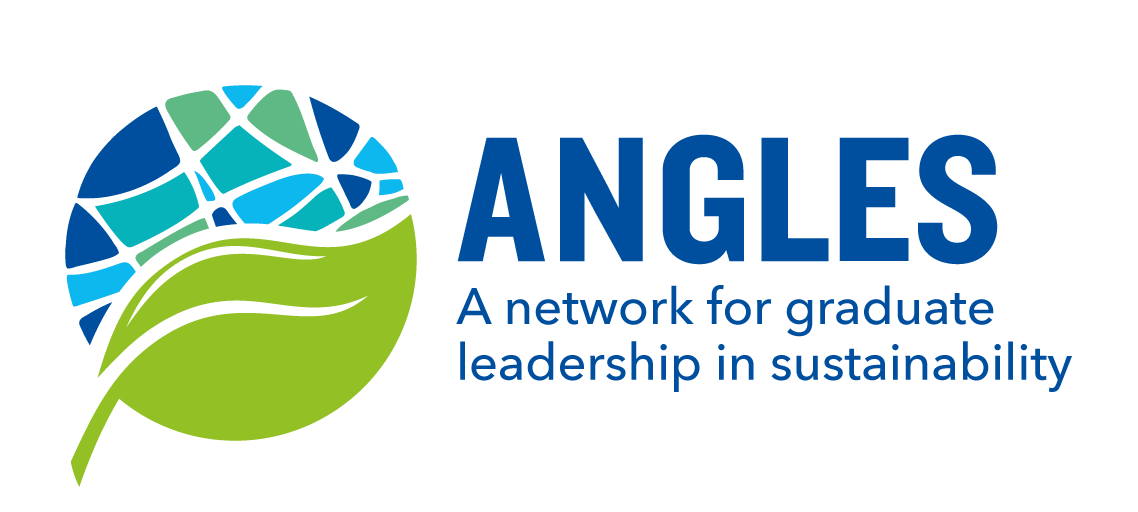Skills and Aptitudes Database
Leadership Training for Graduate Students in Sustainability
This searchable database displays how programs across the United States and Canada teach sustainability leadership skills. It is organized by an aptitude list that was co-created by the ANGLES network, but each program addresses these differently and to varying degrees. Use this database to learn more about what these programs do, make connections and ask questions. Click here to view the network map.
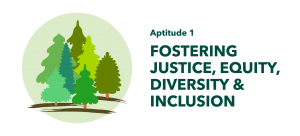
Aptitude 1: Fostering Justice, Equity, Diversity & Inclusion
Building sustainable futures for all requires inclusive decision-making and just problem-solving around a diversity of lived experiences, outcomes, and needs.
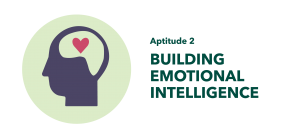
Aptitude 2: Building Emotional Intelligence
Knowing how to value, inspire, and empathize with others will build resilience and maintain integrity despite challenges and setbacks.
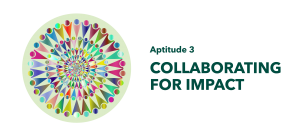
Aptitude 3: Collaborating for Impact
Working in teams is essential when the urgencies and complexities of problems transcend any one discipline and demand novel integration of approaches.
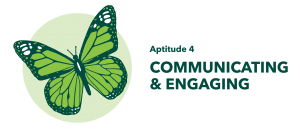
Aptitude 4: Communicating & Engaging
Listening, questioning, and sharing are important for giving to and fostering exchanges between the wide array of perspectives, positions, and priorities for sustainability issues.
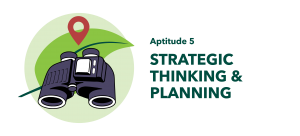
Aptitude 5: Strategic Thinking & Planning
Accounting for high uncertainty and complex interdependencies requires a clear vision, creative approach, and means of measuring progress against goals.
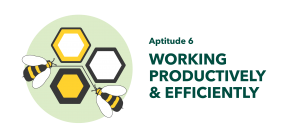
Aptitude 6: Working Productively & Efficiently
The ability to make the most of what you have, while advocating for what more you need, is critical when it comes to balancing competing priorities, resource scarcity, and getting things done.
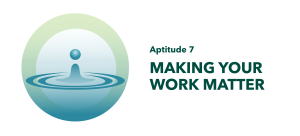
Aptitude 7: Making Your Work Matter
Cultivating relationships and mutual understanding will help push towards solutions requiring buy-in from diverse stakeholders and decision-makers.
| Title of Activity | Training Type & Duration | Description | Program | Institution | Aptitude 1 Skills | Aptitude 2 Skills | Aptitude 3 Skills | Aptitude 4 Skills | Aptitude 5 Skills | Aptitude 6 Skills | Aptitude 7 Skills | Program Text |
|---|---|---|---|---|---|---|---|---|---|---|---|---|
| Anti-Racism in Science | 2-hour workshop | Workshop and discussion on anti-racism and why it is important in STEM, academia, and ocean/marine sciences in particular. | https://anglesnetwork.com/angles_member/training-our-future-ocean-leaders/ | University of British Columbia | apt1-skill1, apt1-skill2, apt1-skill3, apt1-skill4 | Training Our Future Ocean Leaders | ||||||
| Balancing Science and Advocacy | 2-hour workshop | “Stick to the science,” so many of us have heard, or we risk damaging the hard-won reputation of scientists as cautious and rational evaluators of evidence. Yet being effective in engagement with the public and policy-makers often requires words, actions, and generalizations that may be perceived as unscientific. How does a public-facing scientist working on find the balance? There is no one correct answer. This workshop is designed to help students use the available research on communications and critical self-analysis to choose their place on the continuum between science and advocacy. | https://anglesnetwork.com/angles_member/training-our-future-ocean-leaders/ | University of British Columbia | apt2-skill1, apt2-skill2, apt2-skill3, apt2-skill6 | apt5-skill6 | Training Our Future Ocean Leaders | |||||
| Blog Writing | Writing and Peer Review for the Human Nature Blog | Each Fellow writes a blog post and provides peer review for the post of another Fellow. Provides practice with writing scientific narrative that is accessible, fun, and interesting to a non-expert audience, as well as practice giving and receiving feedback from a colleague outside their discipline. Posts are hosted on the SoGES Human Nature blog and open to public comment. | https://anglesnetwork.com/angles_member/sustainability-leadership-fellows/ | Colorado State University | apt4-skill3, apt4-skill5, apt4-skill6 | Sustainability Leadership Fellows | ||||||
| Building and managing your personal board | 90 min. | Organizations build boards to advise them on direction, connect them to the right individuals, help find funding opportunities, and champion their work. Why shouldn't you have a board too? In this session, we work with your network map, identify areas where there are gaps, and identify individuals that you can put on your Board. These are mentors that can be your champion, and that you can check in with from time to time. | https://anglesnetwork.com/angles_member/global-sustainability-scholars/ | University of Colorado Boulder | apt1-skill1, apt1-skill3, apt1-skill4 | apt2-skill1, apt2-skill2, apt2-skill3, apt2-skill5, apt2-skill6, apt2-skill8 | apt3-skill4 | apt4-skill1, apt4-skill2, apt4-skill3 | apt5-skill2, apt5-skill3, apt5-skill4 | apt6-skill1, apt6-skill2, apt6-skill3, apt6-skill4 | apt7-skill2 | Global Sustainability Scholars Program |
| Collective Leadership Workshop | 2-hour workshop | Workshop leads participants through an examination of leadership narratives, dimensions, and skills and features real case studies of successful ecological and environmental management as a framework for learning. | https://anglesnetwork.com/angles_member/training-our-future-ocean-leaders/ | University of British Columbia | apt2-skill4, apt2-skill5, apt2-skill8 | apt4-skill1, apt4-skill2, apt4-skill4 | apt5-skill1 | Training Our Future Ocean Leaders | ||||
| Communicating 'Controversial' Science with Potentially 'Skeptical' Audiences | 4-hour workshop | Understanding beliefs and values of different audiences, appreciating diverse perspectives. Interpreting your own values for a variety of audiences. Listening skills and how to identify shared values. Thinking about secondary audiences, argument beyond a single interaction, and gaining a better understanding of other parties' beliefs. Science communication strategies and communicative rhetoric. | https://anglesnetwork.com/angles_member/sustainability-leadership-fellows/ | Colorado State University | apt2-skill1, apt2-skill3, apt2-skill4, apt2-skill5, apt2-skill6 | apt3-skill1, apt3-skill4, apt3-skill5 | apt4-skill1, apt4-skill2, apt4-skill3, apt4-skill4, apt4-skill5, apt4-skill6 | apt7-skill2, apt7-skill4 | Sustainability Leadership Fellows | |||
| Communicating your Research to the Provost | 2-hour communication exercise and social event | Timed communication exercise for Fellows to describe and sell their research to the CSU Provost in a social setting - prep for Fellows on University leadership structures, Provost leads a talk after on how their job affects and is affected by academic faculty. | https://anglesnetwork.com/angles_member/sustainability-leadership-fellows/ | Colorado State University | apt4-skill3, apt4-skill5, apt4-skill6 | apt6-skill7 | Sustainability Leadership Fellows | |||||
| Community Projects | Integrated team science experience | Projects with community/stakeholders. Includes debrief with program director. | https://anglesnetwork.com/angles_member/earth-system-science-for-the-anthropocene/ | Arizona State University | apt1-skill3, apt1-skill4 | apt2-skill5, apt2-skill6, apt2-skill8 | apt3-skill1, apt3-skill2, apt3-skill3, apt3-skill4, apt3-skill5, apt3-skill6, apt3-skill7 | apt5-skill1, apt5-skill2, apt5-skill4, apt5-skill6 | apt7-skill4, apt7-skill5 | Earth System Science for the Anthropocene | ||
| CSUS 800 - Foundations of Community Sustainability I | University course | Theoretical and conceptual foundations of community sustainability. Sustainability practice. Introduction to ethics, leadership, and community engagement for sustainability. | https://anglesnetwork.com/angles_member/community-sustainability/ | Michigan State University | apt1-skill2, apt1-skill3, apt1-skill4 | apt3-skill4, apt3-skill5 | apt4-skill1 | apt5-skill4, apt5-skill5, apt5-skill6 | apt7-skill1, apt7-skill2 | Community Sustainability | ||
| CSUS 801 - Foundations of Community Sustainability II | University course | Applications of sustainability science and systems thinking for community engagement. Boundary-crossing and organizations. Social change. Sustainability ethics. Facilitation of participatory community processes. Participatory virtues for sustainability. Group dynamics in interdisciplinary and community contexts. | https://anglesnetwork.com/angles_member/community-sustainability/ | Michigan State University | apt1-skill1, apt1-skill2 | apt3-skill1, apt3-skill2, apt3-skill3, apt3-skill4 | apt6-skill4, apt6-skill5 | apt7-skill1, apt7-skill2, apt7-skill4 | Community Sustainability | |||
| CSUS 802 - Introduction to Interdisciplinary Inquiry | University Course | Interdisciplinary, multidisciplinary and transdisciplinary research design. Community engagement as related to research and inquiry. Practical skills for developing inquiry projects. | https://anglesnetwork.com/angles_member/community-sustainability/ | Michigan State University | apt1-skill3 | apt2-skill1, apt2-skill2, apt2-skill3 | apt4-skill1, apt4-skill2, apt4-skill3, apt4-skill4, apt4-skill5, apt4-skill6 | apt5-skill2 | apt6-skill5 | apt7-skill1 | Community Sustainability | |
| Cultural Identity Iceberg | 1-2 hours | Social constructs and cultural groupings inform how we perceive the world around us. This exercise allows students to begin to look at their own lenses and the social constructs that others use to interpret the world around them. Further investigation on how you approach the world gives students more understanding that there is a plurality in the interpretation of sustainability issues. It's easiest to understand others once you understand yourself. 10 minutes to build a cultural identity iceberg. 15 minutes to pair share 3 minutes to amend your ice berg group discussion. | https://anglesnetwork.com/angles_member/global-sustainability-scholars/ | University of Colorado Boulder | apt1-skill1, apt1-skill2, apt1-skill3, apt1-skill4 | apt2-skill1, apt2-skill2, apt2-skill3, apt2-skill4, apt2-skill5 | apt3-skill1, apt3-skill2, apt3-skill4 | apt5-skill4 | Global Sustainability Scholars Program | |||
| CV and Resumé Building | 60 min. | In this workshop, we take a survey of different types of CVs and Resumes and we build our own. We evaluate different ways to tweak your resume for different job types in different sectors. We use a panel of professionals to talk about the cultural norms for resumes and CVs for jobs in their fields. Students share their resumes and CVs to get feedback. | https://anglesnetwork.com/angles_member/global-sustainability-scholars/ | University of Colorado Boulder | apt1-skill1, apt1-skill3, apt1-skill4 | apt2-skill2, apt2-skill3 | apt5-skill4, apt5-skill6, apt5-skill8 | apt6-skill8 | apt7-skill5 | Global Sustainability Scholars Program | ||
| Data Visualization for the Rest of Us | 2-hour training | (Discontinued 2020). Best practices of visual communication and data visualization, including how people interpret visual messages, graphic design basics, and do's and don't's of presenting scientific information in visual formats. | https://anglesnetwork.com/angles_member/sustainability-leadership-fellows/ | Colorado State University | apt3-skill3 | apt4-skill5, apt4-skill6 | apt5-skill5 | Sustainability Leadership Fellows | ||||
| Dialogue | 60 min. | Dialogue is a particular type of communication tool that is designed to create space for idea generation. In this session we introduce and practice the four sills of Dialogue: Voice, Listen, Respect, and Suspend. | https://anglesnetwork.com/angles_member/global-sustainability-scholars/ | University of Colorado Boulder | apt1-skill1, apt1-skill2, apt1-skill3, apt1-skill4 | apt2-skill1, apt2-skill2, apt2-skill3, apt2-skill4, apt2-skill5, apt2-skill6 | apt3-skill1, apt3-skill3, apt3-skill4, apt3-skill5, apt3-skill7 | apt4-skill1, apt4-skill2, apt4-skill4 | apt5-skill2 | apt7-skill2 | Global Sustainability Scholars Program | |
| Difficult conversations | 60 min. | Difficult conversations happen in the best relationships. And they are important to have. We introduce and practice different tools and skills to help students navigate tricky conversations with peers, superiors, and mentees. | https://anglesnetwork.com/angles_member/global-sustainability-scholars/ | University of Colorado Boulder | apt1-skill1, apt1-skill2, apt1-skill3, apt1-skill4 | apt2-skill1, apt2-skill2, apt2-skill3, apt2-skill4, apt2-skill6 | apt3-skill1, apt3-skill4 | apt4-skill1, apt4-skill2, apt4-skill3, apt4-skill4, apt4-skill5 | apt6-skill4, apt6-skill9 | apt7-skill2 | Global Sustainability Scholars Program | |
| Discovering and Strengthening Your Leadership Skills | Workshop | In this module students must answer: What are your visions and goals for your career, and how do those compare with others with very similar backgrounds and research interests? What are your strengths in interacting with others and what are your weaknesses? How can you leverage your strengths and compensate for your weaknesses? Being a self-aware leader means investing energy in discovering how best to work with, inspire, lead and follow others. Components of the leadership training will include:
| https://anglesnetwork.com/angles_member/environmental-impact-fellows/ | Duke University | apt2-skill2, apt2-skill8 | apt3-skill1 | apt5-skill2 | Environmental Impact Fellows | ||||
| Diversity, Equity & Inclusion in S-E Synthesis Graduate Student Workshop | 8-week virtual workshop (2hours/week) | 25 PhD students from diverse disciplines and backgrounds gathered together each week for interactive online training focused on a different topics, such as “Enhancing S-E Synthesis Capacities to Promote Diversity, Equity, Inclusion, and Justice (DEIJ)” and “Advancing DEIJ with Actionable Science.” Workshop sessions and sustained mentoring helped participants build the skill sets needed to undertake an interdisciplinary research collaboration, while also celebrating the innovation potential and problem-solving capacities gained from embracing diverse backgrounds and identities in team-based S-E synthesis research. See the workshop summary here. | https://anglesnetwork.com/angles_member/graduate-student-research-program-graduate-pursuits/ | University of Maryland, College Park | apt1-skill1, apt1-skill2, apt1-skill3, apt1-skill4 | apt2-skill3, apt2-skill4, apt2-skill5, apt2-skill6 | apt3-skill2, apt3-skill3, apt3-skill4, apt3-skill5, apt3-skill6, apt3-skill7 | apt5-skill6, apt5-skill7 | apt7-skill1, apt7-skill2, apt7-skill4 | Graduate Student Research Program | ||
| Effective Presentation Workshop | 3-hour training | Part of a science communication series that focuses on delivering messages clearly and effectively to a variety of audiences. This workshop provides principles for presenting ideas and research in a clear, concise, and accurate matter. After an initial presentation, trainees work to revise a past presentation, and provide peer-to-peer feedback. | https://anglesnetwork.com/angles_member/training-our-future-ocean-leaders/ | University of British Columbia | apt4-skill6 | Training Our Future Ocean Leaders | ||||||
| Elevator Pitch | 30 min. | Students learn to introduce themselves and the work they do to different people within 5 to 15 seconds. Who are they, what they do, what they are working on, and why it's important to that person. We practice with different stakeholders, policy, funders, reporters, and employers, etc. | https://anglesnetwork.com/angles_member/global-sustainability-scholars/ | University of Colorado Boulder | apt1-skill2, apt1-skill3, apt1-skill4 | apt2-skill2, apt2-skill3, apt2-skill6 | apt3-skill4 | apt5-skill4, apt5-skill8 | apt6-skill7, apt6-skill9 | apt7-skill2, apt7-skill3, apt7-skill4, apt7-skill5 | Global Sustainability Scholars Program | |
| Empathy and Understanding of Alternative Value Systems | Workshop | In this module students must answer: What is your personal value system? How has it been shaped by your experiences? By your parents’ belief systems? By the belief systems you have studied? How well do you understand alternative value systems and how much might your lack of knowledge or empathy affect your ability to speak to people quite different from you?
| https://anglesnetwork.com/angles_member/environmental-impact-fellows/ | Duke University | apt1-skill4 | apt2-skill3, apt2-skill4, apt2-skill5, apt2-skill6 | Environmental Impact Fellows | |||||
| Engagement and Implementation | Building and using the intellectual and personal connections necessary for having an impact on environmental sustainability
Who do you need to realize your strategic plan? How will you meet, connect with and communicate with these people? What does engagement look like outside of academia? What do you have in common with and what can you learn from the people you hope to influence? What is an appropriate and effective “ask” in different engagement contexts?
| https://anglesnetwork.com/angles_member/environmental-impact-fellows/ | Duke University | apt7-skill1, apt7-skill2, apt7-skill3 | Environmental Impact Fellows | |||||||
| Engaging with First Nations | 4-hour workshop | This workshop introduces students to special considerations when working with indigenous communities. It includes a presentation and facilitated dialogue about working with indigenous populations in research and policy action, with time for Q&A. | https://anglesnetwork.com/angles_member/training-our-future-ocean-leaders/ | University of British Columbia | apt1-skill1, apt1-skill2, apt1-skill3 | Training Our Future Ocean Leaders | ||||||
| Engaging with Policy Makers | 2-hour workshop and panel | Panel discussion with local policy makers | https://anglesnetwork.com/angles_member/training-our-future-ocean-leaders/ | University of British Columbia | apt7-skill5 | Training Our Future Ocean Leaders | ||||||
| Entrepreneurial Thinking | 2-hour workshop | Group activities applying entrepreneurial thinking to policy scenarios. | https://anglesnetwork.com/angles_member/training-our-future-ocean-leaders/ | University of British Columbia | apt5-skill7 | apt6-skill1 | Training Our Future Ocean Leaders | |||||
| ESSA Immersive Team Science Experience | 1-week immersive experience | Focuses on team science. | https://anglesnetwork.com/angles_member/earth-system-science-for-the-anthropocene/ | Arizona State University | apt4-skill1, apt4-skill2 | Earth System Science for the Anthropocene | ||||||
| Facilitating Collaboration | 2-hour workshop | Workshop builds capacity to engage a group of people and enable them to think together. Central to this ability is the skill of being able to ask questions to understand context: landscape, problem framing, future scenarios.
| https://anglesnetwork.com/angles_member/training-our-future-ocean-leaders/ | University of British Columbia | apt3-skill4, apt3-skill5 | apt4-skill1, apt4-skill2 | Training Our Future Ocean Leaders | |||||
| Fellows Open House | Hosted afternoon social event | A social mixer held to welcome the newly selected cohort of Fellows and celebrate the recently completed year of outgoing Fellows. All past cohorts are invited to attend. | https://anglesnetwork.com/angles_member/sustainability-leadership-fellows/ | Colorado State University | apt6-skill8 | apt7-skill2 | Sustainability Leadership Fellows | |||||
| Fellows Orientation | 2-hour meeting | Orientation meeting designed around building the cohort network and establishing relationships. | https://anglesnetwork.com/angles_member/sustainability-leadership-fellows/ | Colorado State University | apt2-skill8 | apt6-skill8 | apt7-skill2 | Sustainability Leadership Fellows | ||||
| Graduate Leaders in Socio-Environmental Synthesis Workshop | 2.5-day workshop | 25-30 attendees from universities across North America are immersed in a diverse, collaborative environment and provided with tools to broaden their scientific thinking, networks, and practices. Attendees learn how to integrate S-E synthesis concepts, frameworks, materials, and methods into their PhD and master's research. Attendees also practice essential S-E synthesis skills, including developing interdisciplinary questions, thinking at the systems-level, capturing complex processes in research designs, blending disparate ideas and information, working collaboratively, and communicating research to diverse audiences. Attendees receive leadership training as a critical means of effecting change and advancing synthesis research. | https://anglesnetwork.com/angles_member/graduate-student-research-program-graduate-pursuits/ | University of Maryland, College Park | apt2-skill2, apt2-skill3, apt2-skill6, apt2-skill8 | apt3-skill3, apt3-skill5 | apt4-skill5, apt4-skill6 | apt5-skill1, apt5-skill2, apt5-skill4, apt5-skill7 | apt6-skill2 | apt7-skill1, apt7-skill4 | Graduate Student Research Program | |
| Graduate Pursuit Program | 18-month research opportunity | The SESYNC Graduate Pursuits Program is a first-of-its-kind program that supports interdisciplinary, independent, graduate-led research teams. Simultaneous to but apart from their PhD programs, teams conduct data-driven synthesis research over an 18-month period. Teams gain genuine collaborative experiences and skills while contributing to scientific knowledge, solving synthesis problems, and producing peer-reviewed outcomes. Team leaders receive leadership and project management training. Support includes a series of multi-day meetings in Annapolis, MD, sustained virtual engagement, structured mentoring and training from SESYNC staff, and tailored cyberinfrastructure and computational support. A list of Graduate Pursuits can be found here. | https://anglesnetwork.com/angles_member/graduate-student-research-program-graduate-pursuits/ | University of Maryland, College Park | apt2-skill2, apt2-skill3, apt2-skill4, apt2-skill5, apt2-skill7, apt2-skill8 | apt3-skill1, apt3-skill2, apt3-skill3, apt3-skill4, apt3-skill5, apt3-skill6, apt3-skill7 | apt4-skill1, apt4-skill2, apt4-skill3, apt4-skill4, apt4-skill6 | apt5-skill1, apt5-skill2, apt5-skill3, apt5-skill4, apt5-skill5, apt5-skill7 | apt6-skill2, apt6-skill3, apt6-skill4, apt6-skill5 | apt7-skill1, apt7-skill2 | Graduate Student Research Program | |
| Graduate Student Workshop on Socio-Environmental Synthesis | 4-day workshop | This workshop welcomes 25-30 PhD students from around the world and across disciplines to intensive, interactive training at SESYNC. Workshop sessions and activities are led by noted S-E synthesis scholars and practitioners, and range from the science of team science, to interdisciplinary proposal writing and research design, to science communication and delivering actionable outcomes for stakeholders and decision makers. The workshop equips participants with skills, knowledge, networks, and resources to engage in and advance interdisciplinary science and collaboration. The workshop is designed to prepare graduate students to lead and/or join a Graduate Pursuit team. A former CFA can be found here. | https://anglesnetwork.com/angles_member/graduate-student-research-program-graduate-pursuits/ | University of Maryland, College Park | apt2-skill2, apt2-skill3, apt2-skill5 | apt3-skill2, apt3-skill3, apt3-skill4, apt3-skill5, apt3-skill6, apt3-skill7 | apt4-skill5, apt4-skill6 | apt5-skill1, apt5-skill2, apt5-skill4, apt5-skill7 | apt7-skill1, apt7-skill2, apt7-skill3, apt7-skill4, apt7-skill5 | Graduate Student Research Program | ||
| Grand Challenges in Ocean Leadership | course, 2 hours/week | Course provides experience applying data and technical knowledge to develop policy and management solutions for real-world marine and coastal problems and communicating those solutions to the public and policymakers. | https://anglesnetwork.com/angles_member/training-our-future-ocean-leaders/ | University of British Columbia | apt2-skill1 | apt3-skill1 | apt4-skill3 | apt5-skill2 | apt6-skill3 | apt7-skill1 | Training Our Future Ocean Leaders | |
| Honing Your Message Workshop | 2-hour training | Part of a science communication series that focuses on delivering messages clearly and effectively to a variety of audiences. This workshop uses the Message Box approach to help participants frame their narratives and prepare one-pagers on community projects. | https://anglesnetwork.com/angles_member/training-our-future-ocean-leaders/ | University of British Columbia | apt4-skill5 | apt7-skill3 | Training Our Future Ocean Leaders | |||||
| Inclusive science practices - Transdisciplinary Research | 60 min. | When doing transdisciplinary research, making sure that stakeholders or communities most impacted by science and the resulting policies are involved from the onset is important to get it "right". In this session, we talk explore transdisciplinary research, the tools used, best practices and the sticking points. | https://anglesnetwork.com/angles_member/global-sustainability-scholars/ | University of Colorado Boulder | apt1-skill1, apt1-skill2, apt1-skill3, apt1-skill4 | apt2-skill5, apt2-skill6 | apt3-skill1, apt3-skill2, apt3-skill4, apt3-skill6, apt3-skill7 | apt4-skill1 | apt5-skill7 | apt6-skill4 | apt7-skill2, apt7-skill4, apt7-skill5 | Global Sustainability Scholars Program |
| Interfaces of Global Change Capstone Project | Semester+ project | The IGC Capstone Experience is an extracurricular, student-led project under the mentorship of Global Change Center faculty. The capstone experience is designed to provide at least three of the following learning outcomes:
| https://anglesnetwork.com/angles_member/global-change-center/ | Virginia Tech | apt3-skill2, apt3-skill3, apt3-skill4, apt3-skill7 | apt5-skill2, apt5-skill6, apt5-skill7 | Global Change Center | |||||
| Interfaces of Global Change First Semester | Semester-long course | Collectively, the IGC seminars produce the key learning outcomes:
| https://anglesnetwork.com/angles_member/global-change-center/ | Virginia Tech | apt1-skill1, apt1-skill2 | apt5-skill1, apt5-skill4 | Global Change Center | |||||
| Interfaces of Global Change Second Semester | Semester-long course | Collectively, the IGC seminars produce the following key learning outcomes:
| https://anglesnetwork.com/angles_member/global-change-center/ | Virginia Tech | apt2-skill2, apt2-skill3, apt2-skill6 | apt3-skill2, apt3-skill4, apt3-skill5 | Global Change Center | |||||
| Interfaces of Global Change Third Semester | Semester-long course | Collectively, the IGC seminars produce the following key learning outcomes:
| https://anglesnetwork.com/angles_member/global-change-center/ | Virginia Tech | apt6-skill1, apt6-skill2, apt6-skill3, apt6-skill8, apt6-skill9 | apt7-skill2, apt7-skill4, apt7-skill5 | Global Change Center | |||||
| Internship | Optional internship | Explicit focus on scaling with NGOs | https://anglesnetwork.com/angles_member/earth-system-science-for-the-anthropocene/ | Arizona State University | apt5-skill9 | Earth System Science for the Anthropocene | ||||||
| Letters of intent and project two pagers | 60 min. | Writing strong letters of intent and brief proposals is key to shopping your ideas to different funders, communicators, and potential partners. In this workshop, we do just that. | https://anglesnetwork.com/angles_member/global-sustainability-scholars/ | University of Colorado Boulder | apt1-skill1, apt1-skill3, apt1-skill4 | apt2-skill3, apt2-skill6 | apt3-skill2, apt3-skill7 | apt4-skill5, apt4-skill6 | apt5-skill2, apt5-skill4, apt5-skill6, apt5-skill7, apt5-skill8 | apt7-skill1, apt7-skill2 | Global Sustainability Scholars Program | |
| Making an accessible presentation | 60 min. | Students learn about best practices for giving slide presentations. | https://anglesnetwork.com/angles_member/global-sustainability-scholars/ | University of Colorado Boulder | apt1-skill4 | apt4-skill5, apt4-skill6 | Global Sustainability Scholars Program | |||||
| Making Waves | Science-policy event, students present community project to the general public | This event provides trainees an opportunity to practice their communication training by sharing the results of their community projects with stakeholders in the community. | https://anglesnetwork.com/angles_member/training-our-future-ocean-leaders/ | University of British Columbia | apt4-skill6 | Training Our Future Ocean Leaders | ||||||
| Media Training Workshop & Interview Practice | 1.5-hour training | This series exposes students to media interaction and interviews and introduces techniques and approaches to make them effective including mock interviews and practice. | https://anglesnetwork.com/angles_member/training-our-future-ocean-leaders/ | University of British Columbia | apt7-skill3 | Training Our Future Ocean Leaders | ||||||
| Meeting Facilitation 101 (offered some years) | 2-hour training | Running effective meetings including planning, execution, and followup. Essentials of designing and facilitating effective meetings, identifying participants, planning for intended outcomes, inclusion and participation, dealing with conflict, and tips for virtual meetings. | https://anglesnetwork.com/angles_member/sustainability-leadership-fellows/ | Colorado State University | apt1-skill4 | apt2-skill8 | apt3-skill1, apt3-skill2, apt3-skill7 | apt6-skill4, apt6-skill5 | apt7-skill4 | Sustainability Leadership Fellows | ||
| Mentorship/Coaching | Concurrent to program | Working with external and academic advisors to chart individualized curriculum and professional development plan. | https://anglesnetwork.com/angles_member/earth-system-science-for-the-anthropocene/ | Arizona State University | apt2-skill2, apt2-skill3, apt2-skill8 | apt5-skill8 | Earth System Science for the Anthropocene | |||||
| Navigating your story - ladder of inference | 60 min. | This exercise focuses on the "data" and all the different parts of one's inner narrative that can lead to misconceptions and miscommunication. We dissect different situations using the ladder of inference. | https://anglesnetwork.com/angles_member/global-sustainability-scholars/ | University of Colorado Boulder | apt1-skill1, apt1-skill2, apt1-skill3, apt1-skill4 | apt2-skill1, apt2-skill3, apt2-skill6 | apt3-skill1, apt3-skill2, apt3-skill4 | apt5-skill2, apt5-skill5, apt5-skill6 | apt6-skill7 | apt7-skill2 | Global Sustainability Scholars Program | |
| Network Mapping | 60 min. | Students take the time to map their professional networks and layer the different dimensions onto the map. Students identify gaps and set intentions for where we need to do some work in building more connections. | https://anglesnetwork.com/angles_member/global-sustainability-scholars/ | University of Colorado Boulder | apt1-skill1, apt1-skill2, apt1-skill3, apt1-skill4 | apt2-skill2, apt2-skill3 | apt3-skill2, apt3-skill4, apt3-skill6 | apt5-skill2, apt5-skill4, apt5-skill5, apt5-skill6, apt5-skill8 | apt6-skill2 | apt7-skill2 | Global Sustainability Scholars Program | |
| Networking | 1.5 hour brown bag series | Faculty and students discuss lessons from personal experience. | https://anglesnetwork.com/angles_member/training-our-future-ocean-leaders/ | University of British Columbia | apt7-skill2 | Training Our Future Ocean Leaders | ||||||
| Partnering with First Nations | 4-hour workshop | Includes session led by first Nations members on working with researcher. | https://anglesnetwork.com/angles_member/training-our-future-ocean-leaders/ | University of British Columbia | apt7-skill4 | Training Our Future Ocean Leaders | ||||||
| Photo voice projects | 60 min. | Students use photos and stories to convey the impact of their research. Through this method, we hear about aspects of the research process that impact the people doing the work. This is a more personal journey through the story of the research experience. | https://anglesnetwork.com/angles_member/global-sustainability-scholars/ | University of Colorado Boulder | apt1-skill1, apt1-skill2, apt1-skill3, apt1-skill4 | apt2-skill2, apt2-skill3, apt2-skill6 | apt3-skill2 | apt4-skill5, apt4-skill6 | apt5-skill4 | Global Sustainability Scholars Program | ||
| Riding Big Waves: Collaborative Encounters with Conflict | 2-hour training | Training explores systemic drivers of conflict and builds skills towards collaboration in the spirit of courage, comfort, and curiosity. Participants reflect on personal challenges, interpersonal dynamics, and systemic structures through activities and games that offer a new way to look at old patterns. | https://anglesnetwork.com/angles_member/training-our-future-ocean-leaders/ | University of British Columbia | apt3-skill1, apt3-skill2 | apt6-skill9 | Training Our Future Ocean Leaders | |||||
| Risk Analysis and Decision Making Workshop | 2-hour workshop | Workshop helps participants explore dimensions of risk and risk assessment and how this is used to make decisions in project management, environmental assessments, and other situations | https://anglesnetwork.com/angles_member/training-our-future-ocean-leaders/ | University of British Columbia | apt5-skill2, apt5-skill3, apt5-skill4, apt5-skill5 | Training Our Future Ocean Leaders | ||||||
| Rules of engagement | 90 min. | Many professional settings have different unwritten rules for conduct or strategies for different settings. In academia, many of the settings are casual and less official, but there are still expected norms. In this session, we ask what are the rules of engagement for different settings such as professional meetings; managing letter writers and mentors; speaking with program heads at NSF; transitioning to a place of power; reviewing applications, papers, and proposals; and other professional settings. We use a panel of folks from different sectors and have an engaging conversation. | https://anglesnetwork.com/angles_member/global-sustainability-scholars/ | University of Colorado Boulder | apt1-skill1, apt1-skill3, apt1-skill4 | apt2-skill1, apt2-skill2, apt2-skill3 | apt3-skill2, apt3-skill4, apt3-skill6 | apt4-skill1, apt4-skill2, apt4-skill3, apt4-skill5, apt4-skill6 | apt5-skill4, apt5-skill5, apt5-skill6 | apt6-skill2, apt6-skill4, apt6-skill7, apt6-skill9 | apt7-skill2 | Global Sustainability Scholars Program |
| Scenario Planning | 2-hour classroom activity | Intro to scenario planning | https://anglesnetwork.com/angles_member/training-our-future-ocean-leaders/ | University of British Columbia | apt5-skill1 | Training Our Future Ocean Leaders | ||||||
| Science Communication | Workshop | In this module students must answer: How can you most effectively connect to, inspire, educate and influence others with information? In what medium are you best able to express yourself and what mediums would you like to explore? What are different mechanisms of communication for different goals, and how do you prepare for each (e.g., interviews, op-eds, deposition, testimony, memos).
| https://anglesnetwork.com/angles_member/environmental-impact-fellows/ | Duke University | apt4-skill5, apt4-skill6 | apt7-skill3 | Environmental Impact Fellows | |||||
| Science Communication 101 | 5 modules of 75 minutes each | https://anglesnetwork.com/angles_member/global-change-fellows-program/ | North Carolina State University | apt4-skill2, apt4-skill5, apt4-skill6 | apt7-skill1, apt7-skill2, apt7-skill3, apt7-skill4 | Global Change Fellows Program | ||||||
| Science Communication Course | Semester-long course | Interfaces of Global Change Fellows complete a course of choice that teaches science communication skills. The most popular elective course is “Communicating Science” GRAD 5144, taught by the Center for Communicating Science at Virginia Tech. This course is capped at 18 students and is highly participatory, using theatre improvisation games and exercises as well as writing to help students become more effective at distilling their research and communicating it to non-specialist audiences. A focus on relaxation and deep listening helps participants make their communication more personal, direct, spontaneous, and responsive. The course provides opportunities for students to present their research to public audiences. | https://anglesnetwork.com/angles_member/global-change-center/ | Virginia Tech | apt4-skill2, apt4-skill3, apt4-skill5, apt4-skill6 | Global Change Center | ||||||
| Science Communication Workshop | 2.5-day workshop | Workshop led by COMPASS, science communication specialists and guest journalist trainers. Intensive multi-day workshop includes: foundations of effective science communication; knowing your audience and crafting a good narrative; understanding the media, media platforms, and how to talk to journalists; bridging the worlds of science and journalism; and preparing for interviews and interview practice. | https://anglesnetwork.com/angles_member/sustainability-leadership-fellows/ | Colorado State University | apt2-skill2 | apt4-skill5, apt4-skill6 | apt6-skill8 | apt7-skill2, apt7-skill3 | Sustainability Leadership Fellows | |||
| Science communications - Put your message in the box | 90 min. | Students will identify their audience, define their message (who, what, and why) by distilling it into the problem, the so what, the solutions, and the benefit. Small groups, solo time, share out, refine and present. | https://anglesnetwork.com/angles_member/global-sustainability-scholars/ | University of Colorado Boulder | apt1-skill1, apt1-skill3 | apt2-skill3, apt2-skill6 | apt4-skill5, apt4-skill6 | Global Sustainability Scholars Program | ||||
| Science of Team Science | 2-hour training | Working on interdisciplinary teams; building a shared language and vision; change management, negotiation, and conflict resolution; leadership for all team members; justice, equity, diversity, and inclusion on teams. | https://anglesnetwork.com/angles_member/sustainability-leadership-fellows/ | Colorado State University | apt1-skill2, apt1-skill3, apt1-skill4 | apt2-skill8 | apt3-skill1, apt3-skill2, apt3-skill3, apt3-skill4, apt3-skill5, apt3-skill6, apt3-skill7 | apt5-skill2 | apt6-skill5 | Sustainability Leadership Fellows | ||
| Science, Policy, and Interacting with Policymakers | 2-hour training | Understanding the policy landscape, entities, and individuals. Opportunities for science-policy interaction. Best practices for shaping policy decisions and interacting with policy makers as a scientist. | https://anglesnetwork.com/angles_member/sustainability-leadership-fellows/ | Colorado State University | apt3-skill4, apt3-skill5 | apt4-skill5, apt4-skill6 | apt5-skill9 | apt6-skill9 | apt7-skill4, apt7-skill5 | Sustainability Leadership Fellows | ||
| Shrinking story | 90 min. | Students learn how to boil their message down into a bite-size. This is a fun activity to energize the group and to learn how to get a tight message. Students take their research topic and are given 90 seconds to describe it to an identified audience. The moderator changes the audience while they are talking, then they must explain their topic in 30 seconds, then 15 seconds, and 9 seconds. | https://anglesnetwork.com/angles_member/global-sustainability-scholars/ | University of Colorado Boulder | apt1-skill2, apt1-skill3, apt1-skill4 | apt2-skill2, apt2-skill5, apt2-skill6 | apt4-skill2, apt4-skill3, apt4-skill5, apt4-skill6 | apt6-skill9 | apt7-skill3, apt7-skill4, apt7-skill5 | Global Sustainability Scholars Program | ||
| SOS Workshop Course | Semester-long course | https://anglesnetwork.com/angles_member/earth-system-science-for-the-anthropocene/ | Arizona State University | apt1-skill1, apt1-skill2 | apt4-skill1, apt4-skill2, apt4-skill3, apt4-skill4, apt4-skill5, apt4-skill6 | apt5-skill4 | apt7-skill1, apt7-skill3 | Earth System Science for the Anthropocene | ||||
| Story Time with Ocean Leaders | 1.5-hour monthly Discussion Series | Held once per month, the discussion series is focused on a life lesson from an Ocean Leader. The featured Ocean Leader answers the simple prompt: Talk about a story that has impacted you or share how you ended up at UBC. | https://anglesnetwork.com/angles_member/training-our-future-ocean-leaders/ | University of British Columbia | apt2-skill7 | apt6-skill2 | Training Our Future Ocean Leaders | |||||
| Storytelling Trainings (various) | 2-hour training | Variety of past workshops offered different years. Have included storytelling best practices and narrative for writing, for video, and spoken formats. | https://anglesnetwork.com/angles_member/sustainability-leadership-fellows/ | Colorado State University | apt4-skill5, apt4-skill6 | apt7-skill3 | Sustainability Leadership Fellows | |||||
| Strategic Planning for Careers | 12-hour workshop | What is it you hope to accomplish in different phases/stages of your career? In the next five, ten, twenty years of your life? What are the challenges you will have to overcome to meet these goals? What partners will you need? What skills must you attain? What sort of career path will best allow you to accomplish your goals and vision? What are the tradeoffs of different career trajectories? What types of careers exist in your field, and what are the impacts that are possible (and not possible) through those different careers?
| https://anglesnetwork.com/angles_member/environmental-impact-fellows/ | Duke University | apt5-skill8 | Environmental Impact Fellows | ||||||
| The role of qualitative AND quantitative research methods in sustainability | 60 min. | This is a quick introduction to the power of mixed methods and the role of qualitative and quantitative research in complex coupled natural and human systems. This session is best for early-stage graduate students. | University of Colorado Boulder | apt1-skill4 | apt2-skill6 | apt3-skill3, apt3-skill4, apt3-skill7 | apt5-skill2, apt5-skill3, apt5-skill4 | Global Sustainability Scholars Program | ||||
| Time Management and Writing Productivity | 2-hour training | Time management training to maximize productivity, manage work/life balance, achieve deep work and focused time, and aligning tasks to higher-level goals and strategy. Includes strategies for email management, identifying goals, matching projects to goals, work and task planning, time tracking, accountability, and writing productivity. | https://anglesnetwork.com/angles_member/sustainability-leadership-fellows/ | Colorado State University | apt2-skill2, apt2-skill6 | apt3-skill7 | apt5-skill5, apt5-skill6, apt5-skill8 | apt6-skill1, apt6-skill2, apt6-skill3, apt6-skill5 | apt7-skill1 | Sustainability Leadership Fellows | ||
| Unconscious Bias - we all have them | 60 min. | Students read a few articles and talk about unconscious bias and its role in systems. We take unconscious bias tests and pair-share about how it can effect our work. | https://anglesnetwork.com/angles_member/global-sustainability-scholars/ | University of Colorado Boulder | apt1-skill1, apt1-skill2, apt1-skill3, apt1-skill4 | apt2-skill1, apt2-skill2, apt2-skill3, apt2-skill6 | apt3-skill4 | Global Sustainability Scholars Program | ||||
| Writing One-pagers | 2-hour classroom activity | Part of a science communication series that focuses on delivering messages clearly and effectively to a variety of audiences. This workshop focuses on preparing one-page summaries of research for policymakers. | https://anglesnetwork.com/angles_member/training-our-future-ocean-leaders/ | University of British Columbia | apt7-skill5 | Training Our Future Ocean Leaders | ||||||
| Writing YOUR mission statement | 60 min. | Students work on writing their mission statement. This is a statement that has a five-year horizon and aligns with values and ethics. We use this to build out the work that they are doing using flame mode. | https://anglesnetwork.com/angles_member/global-sustainability-scholars/ | University of Colorado Boulder | apt1-skill3, apt1-skill4 | apt2-skill1, apt2-skill3, apt2-skill6 | apt5-skill6, apt5-skill7, apt5-skill8 | apt6-skill2 | apt7-skill1 | Global Sustainability Scholars Program |
